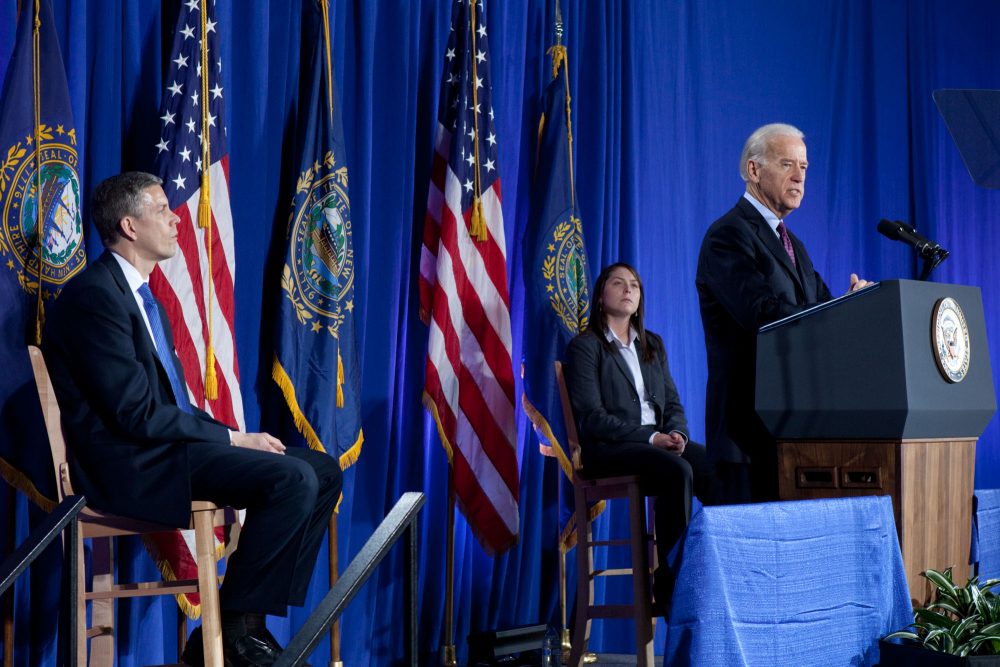Advertisement
The Obama Administration Remade Sexual Assault Enforcement on Campus. Could Trump Unmake It?

On April 4, 2011, Vice President Joe Biden made an announcement to an auditorium full of students at the University of New Hampshire in Durham.
“We are the first administration to make it clear that sexual assault is not just a crime, it can be a violation of a woman's civil rights,” Biden said. The vice president projected indignation and heartbreak, a tone that President Obama and their administration kept up.
Five years later, American higher education has gotten the message that the White House and the Department of Education were sending — and a lot has changed.
But still there are questions. What is an adequate solution for the dark and persistent threat of sexual violence on campus? And what should colleges and universities expect from a very different administration, headed by a president who has himself been accused of sexual assault?
The same day that Biden spoke at UNH, the education department's Office of Civil Rights sent a 19-page document that would come to be known as the “Dear Colleague” letter to colleges and universities.
The letter contained new guidance about Title IX, the federal statute prohibiting sex discrimination “under any education program or activity receiving Federal financial assistance.”
The letter read: “If a school knows or reasonably should know about student-on-student harassment that creates a hostile environment, Title IX requires the school to take immediate action to eliminate the harassment, prevent its recurrence, and address its effects.” And it added that the department’s definition of harassment explicitly includes sexual violence.
Alexandra Brodsky cofounded “Know Your IX" while on campus at Yale Law School; today it's a national student group that supports students who challenge their college or university to prevent "sexual or dating violence." She is clear about the source of that obligation — it's Title IX: “The Obama administration didn’t invent these rights; these are our rights under law.”
The particular legal foundations of the “Dear Colleague” letter date back to 1977, when female students sued Yale over, for example, professors offering an “A” for sex — or a “C” for refusing it. The plaintiffs in Alexander v. Yale argued that sexual harassment was itself a form of sexual discrimination.
They lost their case on a technicality, but the court accepted the legal reasoning: that a university’s failure to adequately confront a hostile climate of sexual harassment could represent a Title IX violation in itself.
“What the [Obama] administration has done,” Brodsky added, “is, for the first time, to hold schools to account through their own enforcement.”
The "Dear Colleague" letter includes a long section on best practices: administrators should inform students reporting an assault of their options, and allow them to speak to police. They should conclude investigations promptly — ideally, within two months. And hearing officers should decide cases of sexual harassment not "beyond a reasonable doubt," but by a “preponderance of evidence” standard — meaning hearing officers don’t need to be convinced that an incident occurred, only that it is more likely than not.
But the critical paragraph comes at the letter's end — an offer most institutions of higher learning can’t refuse:
"When conducting Title IX enforcement activities, OCR seeks to obtain voluntary compliance from recipients. When a recipient does not come into compliance voluntarily, OCR may initiate proceedings to withdraw Federal funding by the Department or refer the case to the U.S. Department of Justice for litigation."
The loss of federal funds could bring many of the richest research universities, public or private, to their knees.
So as the OCR began to announce investigations into the mishandling of reported sexual harassment and violence — 344 since 2011, by the count of the Chronicle of Higher Education — colleges and universities began to change their ways, sometimes dramatically.
It’s that change that makes Alexandra Brodsky describe the Obama administration’s OCR as a “tremendous ally of students and civil-rights activists."
But the Obama approach has its critics. Harvard Law professors Jeannie Suk and Jacob Gersen say it resulted in a “sex bureaucracy,” placing more and more ordinary behavior under federal oversight.
And feminist legal theorist Janet Halley, their colleague who has contested the OCR's process in the Harvard Law Review, describes the “Dear Colleague” letter as a case of “administrative overreach.”
Halley, who has participated in sexual-violence cases at Harvard, has had concerns about their fairness from the beginning.
She took pains to say that she cares deeply about sexual assault, but she worries about an overcorrection, prompted by OCR, that moves universities from ignoring the rights of accusers to trampling on those of the accused.
“Just imagine if you were asked to go in to explain why you didn’t commit a sexual assault,” Halley said. With no information as to what you’re accused of, who’s accusing you, or when it allegedly happened, “you’re required to start explaining yourself. And you’re 18 years old, and no one is helping you."
Halley describes the new system as all but designed to produce “false positives” — innocent students wrongfully punished — both because of the looser evidentiary standard and because of Title IX officers’ desire to produce numbers that show they're taking sexual violence seriously.
In her own experience, Halley says, that has meant that a disproportionate share of those accused, and those punished, are men of color and those who have less access to family resources and legal help.
Alexandra Brodsky also worries about student discipline, especially its racial bias. As a fellow at the National Women’s Law Center, she's made it a professional focus.
But she doesn’t blame the OCR for what she sees as long-lived structural problems with universities.
When students sue their schools over a rape hearing, they often cite the same unfair procedures, whether they’re accused or accusers: “'I didn’t have an unbiased panel'; 'I didn’t have the opportunity to present evidence.' Those are big problems that hurt both sides.”
And, Brodsky added, they’re also violations of Title IX.
The “Dear Colleague” letter also provides robust protections to the accused. For proof, she says, look at an investigation this fall: “DOE actually found a school responsible for violating Title IX because of the way they treated an accused student.”
Janet Halley, who fought to amend Harvard Law School’s approach to Title IX enforcement, believes the school has arrived at a fairer process as a consequence, with “neutral, independent decision-makers,” an open hearing, the right on both sides to see and object to each other’s evidence, and “the right to a meaningful appeal” to a separate authority.
Halley concedes that "fairer" doesn't mean perfect: “It’s not an easy area. We’ll never have happy campers.”

The question now is how the legacy of the Obama years — involving new enforcement, new hires and an unprecedented seriousness — will fare under a Trump administration.
The right-wing press has tended to portray the OCR as the enforcement arm of political correctness; in The National Review, John Fund accused the office of “defining sexual assault down and making it seem more common on campus than it really is” — a worry of Janet Halley's, too.
The office has not always thrived under Republican government; OCR’s staff has shrunk by a quarter since 2000, and has come up short $5 million in annual funding for the past three years of Republican budgets.
As a candidate, Trump threatened to shrink the Department of Education, and even to eliminate it entirely. Any further cuts would stagger an OCR team already moving slowly through more than 280 open investigations, each of which takes an average of almost three years to resolve.
In any event, because the “Dear Colleague” letter is simply federal guidance, the new administration could easily drop or amend it.
But both Halley and Brodsky wonder how likely that is, given the late-campaign revelations about Trump’s personal history. Halley called Trump “kind of like the sexual harasser-in-chief.”
“What he bragged about in those tapes was clearly sexual assault. That’s not a fancy point. The fancier and more difficult point is that he may well find that it suits his interests to continue the political project of OCR basically as a fig leaf for himself,” Halley said. “It may be continued, and even made worse.”
Halley is particularly opposed to the proposal, made in May by Trump campaign co-chair Sam Clovis, to move OCR to the justice department (a change that many say would be very difficult to implement).
She described the prospect of criminalizing the campus assault problem as “catastrophic," taking away the ability of both students and institutions to decide on appropriate rules and remedies tailored to individual cases.
Brodsky also guessed that Trump might not take the political risk of rolling back protections for victims of sexual assault, but added that activists don’t see the president-elect as a natural ally.
Her hope is that the “Dear Colleague” letter will survive as a rights-based, "aspirational" document for student discipline across the board.
Five years after the letter was published, Brodsky believes that schools are beginning to "protect the equality and safety of students of all genders" — not for fear of breaking the law or of losing funding, but because the students themselves have persuaded them that it's the right thing to do.
“The federal government can be and has been a great partner in those conversations,” she said. “But if they're absent, the conversations will continue.”
This article was originally published on November 25, 2016.
